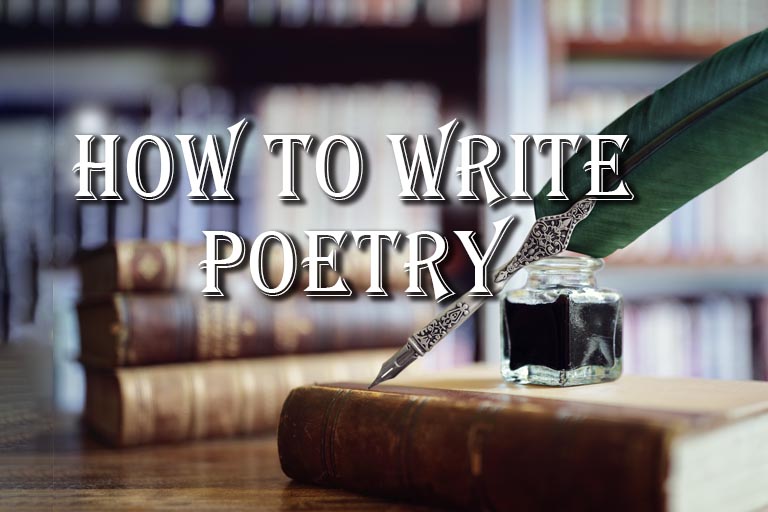HOW TO WRITE POETRY

Writing a Poem
Why do we write poetry? Poetry has long captivated the hearts and minds of people from all walks of life. It is a unique form of expression that transcends cultural, linguistic, and historical barriers. We love poetry for its ability to evoke powerful emotions, convey complex ideas, and explore the depths of human experience in just a few carefully crafted lines. But why should you consider writing your own poetry?
In this blog post, we’ll explore the many reasons why you should dive into the world of poetry and try your hand at writing your own verses. From personal growth to connecting with others, writing poetry offers countless benefits that can enrich your life in surprising ways. So, whether you’re a seasoned wordsmith or a complete beginner, join us as we embark on a journey to unleash the inner poet within you.
UNDERSTANDING POETRY
Before you start writing, it’s essential to understand what poetry is and how it differs from other forms of writing. Poetry is a type of literature that uses language, rhythm, and imagery to evoke emotions, tell stories, or express ideas. The beauty of poetry lies in its ability to condense complex thoughts and feelings into a few carefully chosen words.
CHOOSE A POETRY TOPIC
When it comes to writing poetry, the possibilities are endless. You can write about love, nature, emotions, social issues, or even the mundane aspects of everyday life. The key is to find a topic that inspires you, something that you can genuinely connect with and express through your words.
CHOOSE A FORM OR STYLE
There are numerous poetic forms and styles to choose from, such as sonnets, haikus, free verse, and more. Familiarize yourself with the different forms and find the one that resonates with you. Don’t be afraid to experiment and combine styles to create your unique poetic voice.
FIND YOUR VOICE
Your poetic voice is the unique way you express your thoughts, feelings, and observations. It’s the combination of your choice of words, style, tone, and rhythm. To find your voice, read and analyze various poets, note the techniques they use, and experiment with different styles until you find the one that feels most authentic to you.
USE IMAGERY AND METAPHOR
One of the most powerful tools in a poet’s arsenal is the use of imagery and metaphor. By using vivid descriptions and comparing one thing to another, you can create a more profound emotional impact on your readers. Be creative with your metaphors, and don’t be afraid to use unconventional imagery to paint a picture in your reader’s mind.
RHYTHM AND SOUND
Poetry is as much about sound as it is about meaning. Pay close attention to the rhythm, rhyme, and meter of your poem. Consider using alliteration, assonance, or consonance to create a sense of musicality and enhance the overall experience of reading your poem.
EDITING AND REVISION
Like any other form of writing, poetry requires editing and revision. Once you’ve written your poem, take a step back and read it aloud. Listen for awkward phrasing, unclear imagery, or inconsistencies in rhythm. Don’t be afraid to make changes and refine your poem until it feels just right.
SHARING YOUR WORK
Finally, share your poetry with others. Join a local poetry group, submit your work to literary magazines, or share it on social media. Feedback from others can help you grow as a poet, and you may even inspire someone else to start writing their own poems.

CONSIDER CHECKING OUT OTHER POETS WORKS
Here are five famous poets from different eras and literary traditions who have made significant contributions to the world of poetry:
- William Shakespeare (1564-1616): An English playwright, actor, and poet, Shakespeare is widely regarded as the greatest writer in the English language. Though primarily known for his plays, his sonnets and other poetic works have also gained significant recognition and praise.
- Emily Dickinson (1830-1886): An American poet, Dickinson is famous for her unique style, characterized by unconventional punctuation, slant rhyme, and concise language. Though much of her work was published posthumously, she is now considered one of the most important American poets.
- Pablo Neruda (1904-1973): A Chilean poet, diplomat, and politician, Neruda is known for his passionate, sensual, and deeply emotional poems. He won the Nobel Prize in Literature in 1971 and remains one of the most influential Latin American poets of the 20th century.
- Maya Angelou (1928-2014): An American poet, memoirist, and civil rights activist, Angelou is best known for her series of autobiographies, including “I Know Why the Caged Bird Sings.” Her poetry often tackles themes of love, struggle, and the African American experience.
- Rumi (1207-1273): A 13th-century Persian poet, Islamic jurist, and theologian, Rumi’s poetry has been widely translated and remains popular across the world. His mystical, spiritual poems often explore themes of love, faith, and the nature of the divine.
These poets represent just a small fraction of the diverse voices that have shaped the rich tapestry of poetic tradition. Their works continue to inspire and captivate readers, offering a glimpse into the power and beauty of the written word.
IN CONCLUSION, ON HOW TO WRITE POETRY
Writing poetry is a rewarding and fulfilling journey. By exploring different forms, finding your voice, and honing your craft, you can create beautiful verses that resonate with readers. Keep experimenting, revising, and sharing your work, and most importantly, enjoy the process of crafting your unique poetic vision.
You may also be interested in:


